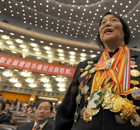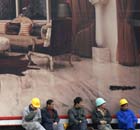Asia-Pacific
UNAIDS praises China's lifting of entry ban on HIV carriers
(Xinhua)
Updated: 2010-04-28 21:33
 |
Large Medium Small |
BEIJING - The UNAIDS Country Coordinator in China said the nation has displayed its global leadership credentials by lifting travel restrictions on people with HIV and AIDS.
"There are 51 countries in the world which still have such restrictions. China's move will have significant global influence and provide very important leadership," Mark Stirling, Country Coordinator of UNAIDS China Office, told Xinhua in an exclusive interview Wednesday.
| ||||
Stirling said it's significant progress by the Chinese government and will help China tackle HIV/AIDS.
"It provides greater opportunities for people with HIV and AIDS (PLWHIV) in China and around the world to exchange experiences. It also spotlights HIV/AIDS issue in public discussions which helps remove stigma and discrimination against PLWHIV," he said.
"The regulatory changes stress that PLWHIV have the same rights as non-positive groups. The change in the government's stance will stimulate changes in the public," he added.
A survey by the China Daily and Sohu.com of nearly 3,500 revealed 84 percent of those interviewed preferred to keep the ban.
In response to the survey result, Stirling said: "It's a very natural reaction of the public. Such will to protect their country is a good thing. However, HIV already exits in every province of China and international travel restrictions will not prevent HIV."
Stirling said the public fear reflects the need for education and public discussions to enable the public to better understand the disease.
Stirling also commended efforts by various groups in making this happen.
"I am sure there has been a lot of dialogue within the government, between the government and the UN system, and between the government and civil society, especially since the Beijing Olympics when the ban was temporarily lifted."
"They finally reached agreement that travel restrictions do not prevent the disease, yet the restriction itself is discriminatory, " he added.
According to the health ministry, the estimated number of people living with HIV in China had reached 740,000 by October 2009, with deaths caused by AIDS totalling 49,845 since the first case was reported in 1985.









